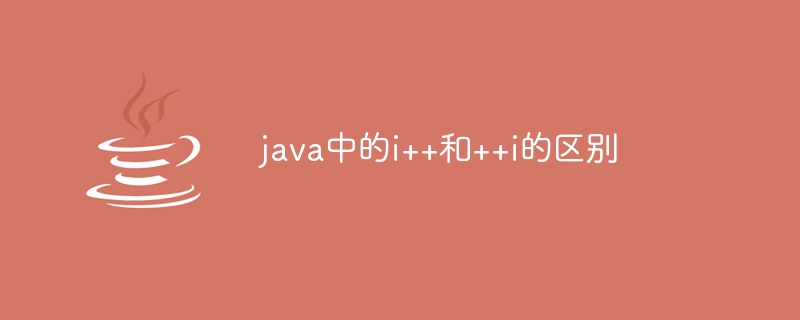The difference between i++ and ++i in java
Apr 29, 2024 am 03:06 AMThe difference between i and i in Java: the order of operations: i first obtains the value and then increments; i first increments and then obtains the value. Return value: i returns the value before auto-increment; i returns the value after auto-increment. Usage scenarios: When avoiding side effects or controlling the order of evaluation of conditional statements, you need to pay attention to the difference between the two.

The difference between i and i in Java
In Java, i and i are both increment operators , but the way they operate on variables is slightly different.
i (post-increment)
The post-increment operator i will first obtain the current value of i, and then increase the value of i by 1.
int i = 10; int result = i++; // result = 10 System.out.println(i); // 输出 11
i (prefixed increment)
The prefixed increment operator i will first increase the value of i by 1, and then obtain the value of i.
int i = 10; int result = ++i; // result = 11 System.out.println(i); // 输出 11
Difference
Return value:
- i Returns the original value and then increments it.
- i returns the new value after incrementing.
Evaluation order:
- i The expression is evaluated first, then incremented.
- i is incremented first, then the expression is evaluated.
Usage scenarios:
In most cases, using i and i won't make much of a difference. However, in some cases it is important to understand the difference between them, for example:
- Avoid side effects: If there are multiple increment operators in an expression, Using i ensures that the increment operation occurs after the expression is evaluated, thus avoiding unexpected side effects.
- Conditional statements: If i is used in a conditional statement, the original value will be used to evaluate the condition before it is incremented. Instead, i will be incremented first and then the condition will be evaluated.
The above is the detailed content of The difference between i++ and ++i in java. For more information, please follow other related articles on the PHP Chinese website!

Hot Article

Hot tools Tags

Hot Article

Hot Article Tags

Notepad++7.3.1
Easy-to-use and free code editor

SublimeText3 Chinese version
Chinese version, very easy to use

Zend Studio 13.0.1
Powerful PHP integrated development environment

Dreamweaver CS6
Visual web development tools

SublimeText3 Mac version
God-level code editing software (SublimeText3)

Hot Topics
 How does Java's classloading mechanism work, including different classloaders and their delegation models?
Mar 17, 2025 pm 05:35 PM
How does Java's classloading mechanism work, including different classloaders and their delegation models?
Mar 17, 2025 pm 05:35 PM
How does Java's classloading mechanism work, including different classloaders and their delegation models?
 Top 4 JavaScript Frameworks in 2025: React, Angular, Vue, Svelte
Mar 07, 2025 pm 06:09 PM
Top 4 JavaScript Frameworks in 2025: React, Angular, Vue, Svelte
Mar 07, 2025 pm 06:09 PM
Top 4 JavaScript Frameworks in 2025: React, Angular, Vue, Svelte
 How can I use JPA (Java Persistence API) for object-relational mapping with advanced features like caching and lazy loading?
Mar 17, 2025 pm 05:43 PM
How can I use JPA (Java Persistence API) for object-relational mapping with advanced features like caching and lazy loading?
Mar 17, 2025 pm 05:43 PM
How can I use JPA (Java Persistence API) for object-relational mapping with advanced features like caching and lazy loading?
 How do I use Maven or Gradle for advanced Java project management, build automation, and dependency resolution?
Mar 17, 2025 pm 05:46 PM
How do I use Maven or Gradle for advanced Java project management, build automation, and dependency resolution?
Mar 17, 2025 pm 05:46 PM
How do I use Maven or Gradle for advanced Java project management, build automation, and dependency resolution?
 How do I implement multi-level caching in Java applications using libraries like Caffeine or Guava Cache?
Mar 17, 2025 pm 05:44 PM
How do I implement multi-level caching in Java applications using libraries like Caffeine or Guava Cache?
Mar 17, 2025 pm 05:44 PM
How do I implement multi-level caching in Java applications using libraries like Caffeine or Guava Cache?
 Node.js 20: Key Performance Boosts and New Features
Mar 07, 2025 pm 06:12 PM
Node.js 20: Key Performance Boosts and New Features
Mar 07, 2025 pm 06:12 PM
Node.js 20: Key Performance Boosts and New Features
 Iceberg: The Future of Data Lake Tables
Mar 07, 2025 pm 06:31 PM
Iceberg: The Future of Data Lake Tables
Mar 07, 2025 pm 06:31 PM
Iceberg: The Future of Data Lake Tables
 Spring Boot SnakeYAML 2.0 CVE-2022-1471 Issue Fixed
Mar 07, 2025 pm 05:52 PM
Spring Boot SnakeYAML 2.0 CVE-2022-1471 Issue Fixed
Mar 07, 2025 pm 05:52 PM
Spring Boot SnakeYAML 2.0 CVE-2022-1471 Issue Fixed







